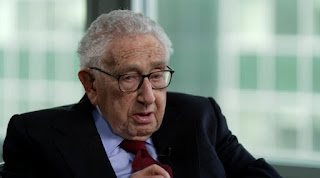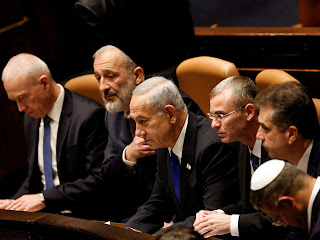Henry Kissinger: an itinerary by steps of the great geopolitical strategist vibrant engagement
Giving a big picture of what has been the political contribution of the
mastermind of Realpolitik, a strategy focused on the great
powers' interests, and how it tackled many geopolitical crises, this essay is
going to pinpoint the steps of his diplomatic career from the epoch of Cold War
to nowadays.
Taking over the charge of US Secretary of State and US National
Security Advisor in the ‘70s, under Richard Nixon and Gerald Ford presidencies,
let’s have a look at the official data concerning his academic and political
battles in the name of his republican values. The magician of the foreign
relations USA has ever had, strived to build a shared future on the
international scene, although thwarted by many parts.
Kissinger, a German refugee that was escaped from Nazism, was credited
in the US with several diplomatic achievements. After serving US Army, he
accomplished his M.A. and Ph.D. in Political Science at Harvard University,
whose thesis was titled Peace, Legitimacy, and the Equilibrium, focused
on the concept of "legitimacy”. He didn’t confuse legitimacy with justice
but he based it on an international order accepted by all of the prominent
powers, whereas an international order not welcomed by one or more of the great
powers would have been "revolutionary".
After Nixon became president in January 1969, Kissinger was appointed
National Security Advisor, demonstrating to be one of the most important
foreign policy theorists.
Kissinger and Nixon offset their differences, being the former an
international citizen, and the latter a classic American Stateman.
Vetting his outstanding role in the Asia-Pacific region to restore peace
and to adjust the scheme of the US international relations, offering an
overarching framework of his winning strategies, we can not mention his
policy of détente, that of relaxation of USA- Soviet
frictions. Furthermore, he was the author of the rapprochement with
the People's Republic of China Premier Zhou Enlai.
Détente and opening to the PRC
During the meetings held at the beginning of 1970s in China, Premier
Zhou Enlai, then in charge of foreign policy, demanded the US recognize that
Taiwan was a legitimate part of the PRC, pull U.S. forces out of Taiwan, and
end military support for the Kuomintang regime. Kissinger accepted his requests
by promising to pull 2/3 of the U.S. forces out of Taiwan when the Vietnam war
would be ended. During these visits, came up the issue of which Chinese
government deserved to be represented in the UN. Kissinger advised Zhou that,
according to a public opinion poll, 62% of Americans wanted Taiwan to remain a
UN member and asked him to consider the "two Chinas" compromise,
proposed by Bush, to avert offending American public opinion. Finally,
Kissinger agreed to the decision of the UNGA to expel Taiwan and to give the
PRC's seat on the UNSC.
Kissinger's journeys paved the way for the 1972 Summit between Nixon,
Zhou, and Mao Zedong, resulting from 23 years of diplomatic isolation and
mutual hostility, realizing a strategic anti-Soviet alliance between the PRC
and the US, enhancing their economic and cultural exchanges and establishing
"liaison offices" in the PRC and American capitals.
Vietnam War
When he came into office in 1969, Kissinger prompted a negotiating
strategy according to the US and North Vietnam would sign an armistice and
agreed to pull their troops out of South Vietnam while the South Vietnamese
government and the Viet Cong agreed to a coalition government. Kissinger's
intention, notwithstanding Nixon's theory of holding a strong
"linkage", was to leverage the Soviet Union influence over the US and
unlike Nixon was less concerned about the ultimate fate of South Vietnam.
Kissinger played a key role in bombing Cambodia to disrupt raids into
South Vietnam, an action that provoked the rise of the Khmer Rouge and its
monstrous horrific massacre of more than a million people and for which he was
criticized as a war criminal and as a perpetrator of gross violations of human
rights.
After several attempts of persuasion of Theu, on January 1973, Kissinger
and Thọ signed a peace agreement that called for the complete withdrawal of all
U.S. forces from Vietnam in exchange for North Vietnam freeing all the U.S.
POWs. Along with Thọ, Kissinger was awarded the Nobel Peace Prize in December
1973, for their negotiations of the ceasefires contained in the Paris Peace
Accords on "Ending the War and Restoring Peace in Vietnam", not for
the sake of American treasures but to avoid further bloodshed. Thọ rejected the
award, telling Kissinger that peace had not been restored in South Vietnam.
Kissinger humbly accepted it and donated it to the children of American service
members killed in Indochina.
In 1974, the US Congress passed a bill restricting American aids
to South Vietnam to $700 mln annually. At the same time, Kissinger lobbied
Brezhnev, Mao and Zhou to stop Chinese military aid to North Vietnam. The
following year, Kissinger urged Congress to redouble the military aid budget to
South Vietnam to save the PAVN as the ARVN advancement on Saigon. Aids that
were refused. Kissinger believed at that time and until his death, that if only
Congress had approved his request South Vietnam would have been able to
resist.
Kissinger argued that some countries, such as China, supported Pol Pot
as a counterweight to Vietnam and USA. Kissinger declared he did not approve of
this due to the genocide and that he would not have any skin in the game with
Pol Pot, observing that the Thais and the Chinese did not want a
Vietnamese-dominated Indochina.
Arab–Israeli conflict
In 1973 Kissinger admitted that he was so absorbed with the Paris peace
talks that in Washington he missed the significance of the Egyptian-Saudi
alliance. Sadat expelled Soviet advisors from Egypt in 1972, attempting to
involve USA to disentangle his country from the Soviet sphere of influence.
Although at first Kissinger tried to delay informing Nixon of the imminent
start of the Yom Kippur War to refrain him from
interfering in the nascent conflict, in the meanwhile he negotiated a ceasefire
with Moscow. Kissinger wanted to stall a ceasefire to gain more time for Israel
to push across the Suez Canal and promised the Israeli PM that the US would
replace its losses in equipment after the war, as he believed it would enhance
the peace process under the guidelines of UNSCR 242. In 1973, Meir requested
$850 mln of American arms and equipment to replace its material losses. Nixon
instead sent some $2 bln. The weapons supplies enraged King Faisal of Saudi
Arabia, who retaliated by placing a total embargo on oil shipments to the US.
Just in 1974, the king ended this embargo, after Kissinger had promised to sell
Saudi Arabia the military aid that it had previously denied fearing they might
be used against Israel.
Kissinger lobbied Israel to cede some of the newly captured land back to
its Arab neighbors, contributing to the first phases of Israeli–Egyptian
non-aggression. He then started a "shuttle diplomacy"
flying between Tel Aviv, Cairo, and Damascus in a bid to make the armistice the
basis of a permanent peace. From the negotiations resulted two ceasefires
between Egypt and Israel, Sinai I in January 1974, and Sinai
II in September 1975.
After his attempts to limit Soviet influence on Persian
Gulf, supporting the Kurdish peshmerga guerrillas
fighting for independence from Iraq; turning a cold eye to the 1971 genocide in
Bangladesh; his engagement in Latin America with 1977
US-Panama treaties; the support on 1973 Chile coup
that would have prevented the socialist Allende from coming into power;
in Argentine backsiding the Argentine Armed Forces
that toppled down the government of Isabel Peròn giving the ‘green light’ to
the clandestine repression against leftwing guerrillas and other dissidents
kept in concentration camps before execution, urging for the restoration of
normal procedures; backing Brazil’s nuclear weapon
program; the air attacks against Fidel Castro’s Cuba for
his decision to send troops in Angola and, finally, after the Watergate
Scandal, Kissinger continued to serve his country under Ford presidency until
the end of his mandate and continued to participate in policy groups and to
maintain political consulting, speakings, and writings from his homonym
consulting firm, Kissinger Associates, giving an unparalleled
contribution for the development of US foreign policy and masterclass in the
statesmanship.
One month before his death, on November 29, 2023,
in his home in Connecticut, about the 2023 Hamas- Israeli war,
he declared the goals of Hamas can only be to mobilize the Arab world against
Israel and to get off a track of peaceful negotiations.
During his lifetime, Kissinger generally received polarizing reactions:
some have portrayed him as a strategic genius who struggled to act in a
utilitarian manner, many others have depicted his foreign policy decisions as
immoral and damaging in the long run. Many reputed him as one of the most
effective secretaries of state in American history, but many activists and
human rights lawyers have sought to prosecute him for war crimes, condemning
him for the destruction of civilian populations and the environment in
Indochina during the years 1969–1975 and accusing him of crimes against
humanity, and of offenses against common or customary or international law,
including conspiracy to commit murder, kidnap, and torture.
According to other perspectives, his role was simply overrated and his
theories were almost conventional. Shortly, he wasn’t a war criminal but he
wasn’t a very sophisticated thinker.
Kissinger gave shape to the history of the nation during the Cold War
with an outstanding control of policymaking in International Affairs. If it is
possible for diplomacy to be a form of art, Henry was an artist.
Looking ahead, US and the entire world have now to learn the lesson he
gave to humanity in achieving bold pursuits for the sake of the Realpolitik,
that privileged the interests of the superpowers, in an insurgence of both
patriotism and nationalism, to the disadvantage of the less influential
countries, following what later Trump called “America first”, in a world where
leadership matters and where it’s continuously necessary redefining boundaries
of opportunities. In a game of balance of powers with the Soviet Union in the
international theatre, he detached himself with skepticism from the Wilsonian
idealism, that has so often characterized U.S. foreign policy, believing that
Washington could reorder the world in America’s image.
The key to his approach was to identify achievable goals rather than
permanent solutions and for him, peace-making diplomacy was a process designed
to ameliorate conflicts between competing powers, not resolve them.
He defined this realist philosophy in Diplomacy, his 1994
masterwork, in which he wrote: “International systems live precariously. Every
‘world order’ expresses an aspiration to permanence. … Yet the elements which
comprise it are in constant flux”. Until the end, Kissinger worked around the
clock in a series of writings culminating in a book titled The Age of
AI, 2021, where he expressed his deep concerns that things were going to
the wrong direction, as “relying on machines powered by data and algorithms and
ungoverned by ethical or philosophical norms.” It would be missed the human
element.
Kissinger left to the world a very complex legacy that taught us the
primacy of diplomatic negotiations over the iron fist, providing solutions that
step by step revealed to be suitable and successful without expecting a
permanent status quo that wouldn’t be steady in the long
run. It was his myope approach to the conflicts to fulfill the imminent needs
and to buffer the most relevant frictions in the Middle East and Latin America,
always taking into account the supremacy of US and super-powers interests and
acting as an excellent guardian of the democratic and liberal values of his
adoptive country.
Good luck in your next big trip in the mystery of our galaxy, dear
Kissinger! The world will miss a genial equilibrist of unbelievable strength
and tenacity that, by his talented savoir faire, gave a breath
from the collisions between the main communist countries and the US, uniting
the world in a more relaxing political atmosphere and giving room to talks and
compromises that in the past were supposed to be unthinkable!




Comments
Post a Comment